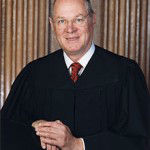Same-Sex Marriage: Will Justice Kennedy Again Provide the Swing Vote?

Justice Anthony Kennedy is often the deciding swing vote in key cases before the U.S. Supreme Court. As a result, he receives a lot of attention during oral arguments. Some have even characterized it as “kissing up.”
As highlighted in a recent Washington Post column, both sides frequently addressed Justice Kennedy during the two same-sex marriage arguments. The following are just a few examples:
“To go back to Justice Kennedy’s point …”
“With all due respect, Justice Kennedy …”
“With respect, Justice Kennedy …”
“As Justice Kennedy said …”
In many ways, the attention is warranted. In a Court comprised of four liberal judges and four conservatives, Kennedy has shown that he cannot be so easily labeled, following in the footsteps of Justice Sandra Day O’Connor. In several cases on abortion, Kennedy has sided with conservatives in upholding restrictions, such as laws criminalizing partial-birth abortion and requiring minors to obtain parental consent. Kennedy also sides with conservative on the issue of gun control, agreeing to strike down the District of Columbia’s ban on handguns in District of Colombia v. Heller.
At the same time, Kennedy has also voted with the liberal block in favor of gay rights. In fact, he authored the opinion in Romer v. Evans, invalidating a Colorado law denying homosexuals the right to pursue housing discrimination claims. He also wrote the opinion in Bowers v. Hardwick, which struck down a law criminalizing sodomy.
Predicting that Kennedy will be the deciding fifth vote in any same-sex marriage decision, court watchers were understandably focused on his remarks during oral arguments. The general consensus is that Kennedy is leaning in favor of striking down the Defense of Marriage Act (DOMA). “It seems to me there’s injury here,” he said. Kennedy also expressed concern that the federal legislation interferes with states’ right to regulate marriage.
Despite Justice Kennedy’s long track record of casting the decisive vote, recent cases remind us that all of the justices have the potential to influence a decision. Most recently, Chief Justice John Roberts surprised many by casting the crucial vote to save the Affordable Care Act.
Thus, while history may often help predict the outcome, the only legal certainty is the Court’s ultimate decision, which is not due until June.
Previous Articles
SCOTUS Sides With NRA in First Amendment Dispute
by DONALD SCARINCI on June 25, 2024
In National Rifle Association of America v. Vullo, 602 U.S. ____ (2024), the U.S. Supreme Court rul...
SCOTUS Rules Challenged South Carolina District Is Not a Racial Gerrymander
by DONALD SCARINCI on June 19, 2024
In Alexander v. South Carolina State Conference of the NAACP, 602 U.S. ____ (2024), the U.S. Suprem...
SCOTUS Holds No Time Limit for Damages Under Copyright Act
by DONALD SCARINCI on June 17, 2024
In Warner Chappell Music, Inc. v. Nealy, 601 U.S. ____ (2024), the U.S. Supreme Court held that the...
The Amendments
-
Amendment1
- Establishment ClauseFree Exercise Clause
- Freedom of Speech
- Freedoms of Press
- Freedom of Assembly, and Petitition
-
Amendment2
- The Right to Bear Arms
-
Amendment4
- Unreasonable Searches and Seizures
-
Amendment5
- Due Process
- Eminent Domain
- Rights of Criminal Defendants
Preamble to the Bill of Rights
Congress of the United States begun and held at the City of New-York, on Wednesday the fourth of March, one thousand seven hundred and eighty nine.
THE Conventions of a number of the States, having at the time of their adopting the Constitution, expressed a desire, in order to prevent misconstruction or abuse of its powers, that further declaratory and restrictive clauses should be added: And as extending the ground of public confidence in the Government, will best ensure the beneficent ends of its institution.




